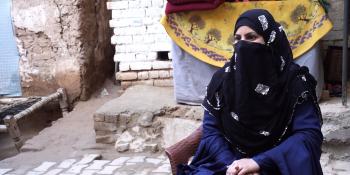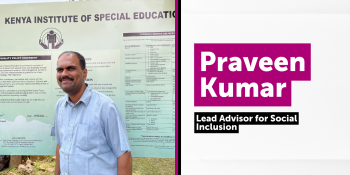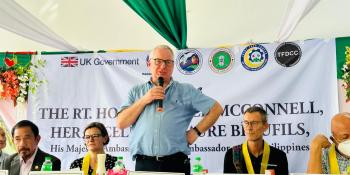More than 130 million girls are out of school. Many dropped out due to pressure to marry too young, robbing them of their childhoods, their rights and their future. But it's not too late to rescue them from a bleak future.
Too many girls around the world are forced into the role of ‘wife’ before they can ever realise their dreams of finishing school.
Globally, one in three girls is married before the age of 18. In developing countries, one in seven gives up her childhood to become a bride before the age of 15.
It's unfair. Girls should be learning to read and write rather than how to cook and clean. They should be free to pursue their own dreams.
So why does it happen?
It's a complex issue for families, tangled up with tradition, poverty and protection.
The pressure of poverty
A history of violent conflict, instability and drought has left Karamoja the poorest region of Uganda.
4/5 famililies live below the poverty line. VSO research uncovered an unexpected pressure on them that's keeping their daughters out of school.
Here as in many societies, families receive 'bride price' when a daughter is married off, usually in the form of cows or goats. This leads girls to be viewed in terms of what they're worth as a bride above anything else.
What's unusual in Karamoja is the link between the value of the 'bride price' and the amount of education a girl has: the more educated she is, the less she's worth.
Branded a 'harlot' for going to school
VSO volunteer researcher Pauline Faughan found parents below the poverty line trying to make the best choice for their families:
“In Karamoja, the best preparation the community felt for a traditional marriage was for the girl to be at home, no education,” she explains.
“If you’ve no support from home to go to school, and you are meeting additional challenges, you are seen as more valuable at home in terms of the physical work you can do, and in terms of your marriage prospects - you drop out,” Pauline adds.
Facing an impossible decision
When your children go to bed hungry, the choices you face as a parent or guardian are pretty stark.
John, 45, is guardian to his nephew and niece in Moroto, Karamoja where only 1/16 girls finishes primary school. There are only resources for one child to go to school, and it's Paul who has been prioritised.
Meanwhile sister Mojo, 10, stays at home cooking and cleaning. She desperately wants to go to school so she can get a good job and drive poverty from her family - but right now it's not an option.
"Mojo is a good, simple and bright girl. She even understands when we don't have enough food to eat," says Uncle John.
"I wish I could help her, but what can I do? If I get a day's work I am paid 3,000 Ugandan shillings [62p] and we need to use it to buy food."
For now, John's trying to keep Mojo from relatives who want to marry her off. But he acknowledges it's only a matter of time:
"I don't want her to return to the village where she was born because then she will be forced to get married. I have seen girls have lots of problems when they are married young. They lack clothes and food.
"My wish is for her to go back and finish school, and then after get employed and find better life. But what can I do?
"If she gets married, I will receive bride price and I will look after it. Mojo can be married for 28 goats."
A vicious cycle
The impact of robbing girls of an education doesn't end with them. The damage is felt across the generations: children of mothers who can't read are 50% more likely to die before the age of five.
It's a vicious cycle. Girls who drop out fall pregnant, having children who are themselves more likely to be uneducated, unhealthy and trapped in poverty.
But we can break the cycle. Education could turn around the fortunes of a whole generation of women and girls.
Income in a girl’s future is boosted by up to an incredible 20% for each additional year of secondary education.
In fact, if all girls had secondary education in sub-Saharan Africa and South and West Asia, child marriage would fall by 64 per cent. We would save the lives of three million children under five each year.
Fighting to stay in school
Girls across the world are going to extraordinary lengths to stay in school. They are overcoming huge challenges - and we must support them.
Jackline, now 24, remembers how tough it was to go to school:
“My dad never wanted us to go to school. He said if we went, we would become prostitutes.
“My mother tried to help us escape out of the small gates surrounding our village, but sometimes he was waiting for us to beat us. When he died, then there was no money for us to go to school.”
Thanks to training provided by VSO at a local vocational college, Jackline was able to finish her education and is now a qualified animal health worker. With that income, she bought some land and started her own sorghum business providing a lifeline for her and her daughter.
"I've even been able to pay for my younger sister's school fees," says Jackline proudly.
"When a girl is educated she is independent. She can mind her own business, her own life, her health and her future."
Levelling the playing field for girls
It's not fair that girls face so many additional challenges to get an education.
With our expertise and trained education specialists, VSO volunteers are working with the world's most disadvantaged girls. From Nepal to Bangladesh, Uganda to Ghana, we're working to get girls back in school and keep them there - and out of early marriage.
In Nepal, we're training girls who have finished their education to be role model mentors - 'Big Sisters' - to girls who are at risk of dropping out due to early marriage, poverty or other issues facing girls.
They support girls and also speak to their parents and families about the importance of education.
It works - after the first phase of the project 92% of girls enrolled in the programme were still in school.
These mentors are even preventing early marriages from happening outright.
Similar successes are happening in Bangladesh, where VSO youth volunteers are running peer education sessions on child rights and the health dangers of early marriage and pregnancy.
In one town, Rangpur, volunteers worked with the community to establish a 'child marriage prevention committee' that's already preventing underage marriages from taking place.
We are already making a difference to girls, but we could be doing so much more.
A ripple effect
Every girl has a right to an education. To follow her dreams and unlock her true potential.
The opportunities available to her, her community and her family are amplified.
She can lift herself out of poverty, if the structures are in place to equip her with the tools and freedoms to do so.
But it's not just the individual girl who benefits.
When girls are able to finish school, the positive ripple effect across their community and their country is real.
Together, we can end the shocking inequality facing girls and make sure they get a fairer start in life.
Read more

"Girls deserve an education just as much as boys"
Meet 26 year-old community volunteer Salma Rehmat from Afghanistan. Salma advocates for Afghan refugees and host communities in Pakistan to access a quality education. Find out more.

Life at VSO: Praveen Kumar, Global Lead Advisor for Social Inclusion
Praveen Kumar Gurunath has been working with VSO for the past 18 years in various roles, and for the past five years as the Global Lead Advisor for Social Inclusion. Find out more about his experience at VSO.

Former First Minister of Scotland welcomes launch of VSO peacebuilding project in the Philippines
On 23 January, Lord Jack McConnell, former First Minister of Scotland and former VSO volunteer, visited Camp Badre in Maguindanao del Norte, the Philippines. Hear his reflections from the trip.
